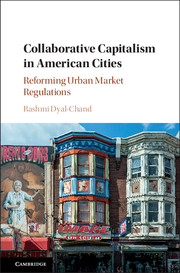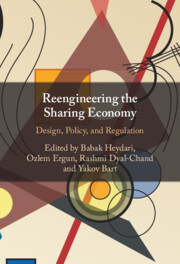Collaborative Capitalism in American Cities
In many American cities, the urban cores still suffer. Poverty and unemployment remain endemic, despite policy initiatives aimed at systemic solutions. Rashmi Dyal-Chand's research has focused on how businesses in some urban cores are succeeding despite the challenges. Using three examples of urban collaborative capitalism, this book extrapolates a set of lessons about sharing. It argues that sharing can fuel business development and growth. Sharing among businesses can be critical for their economic survival. Sharing can also produce a particularly stable form of economic growth by giving economic stability to employees. As the examples in this book show, sharing can allow American businesses to remain competitive while returning more wealth to their workers, and this more collaborative approach can help solve the problems of urban underdevelopment and poverty.
- Proposes systemic solutions to American urban underdevelopment and poverty
- Uses interviews and a case study methodology to develop a theory of market behavior
- Compares examples of collaboration and sharing in different contexts and industries
Reviews & endorsements
'An eye-opening exploration of how cooperation might temper the harshness of economic competition and reverse our slide into inequality while restoring a measure of economic stability to the many who have lost it in recent years.' Joseph William Singer, Bussey Professor of Law, Harvard Law School, Massachusetts and author of No Freedom Without Regulation: The Hidden Lesson of the Subprime Crisis
'What Dyal-Chand draws from these case studies, and several other examples to which she alludes, is nothing short of a new, distinctive approach to social enterprise in the urban core …The proverbial lifting of boats is not - in Dyal-Chand’s telling - the result of a rising tide or even a pull from the surface by some traditional for-profit company. Rather, it results from intentional, focused, collaborative efforts to foster businesses that prioritize workers and their communities.' Nestor M. Davidson, Fordham University, New York
'Focusing on the tricky challenges of inner-city economic regeneration, this account offers a fresh perspective, both theoretically and methodologically, from which to understand how pragmatic practices of collaboration and sharing can deliver economic stability, capitalist growth and inclusion.' Lorna Fox O’Mahony, University of Essex
Product details
May 2018Hardback
9781107133532
290 pages
235 × 156 × 20 mm
0.53kg
Available
Table of Contents
- 1. Introduction
- Part I. Collaborative Capitalism Defined:
- 2. Home care in the Bronx and Philadelphia
- 3. Capitalist sharing and economic stability
- Part II. Collaborative Capitalism Explored:
- 4. Rehabilitating South Shore
- 5. Regulating against sharing
- 6. More than a day's work in Austin
- 7. Understanding collaborative capitalism
- Part III. Collaborative Capitalism Reinvigorated:
- 8. Collaborative capitalism refined: the 'sharing economy'
- 9. Regulating for sharing
- 10. Reforming laws to support collaborative capitalism.










